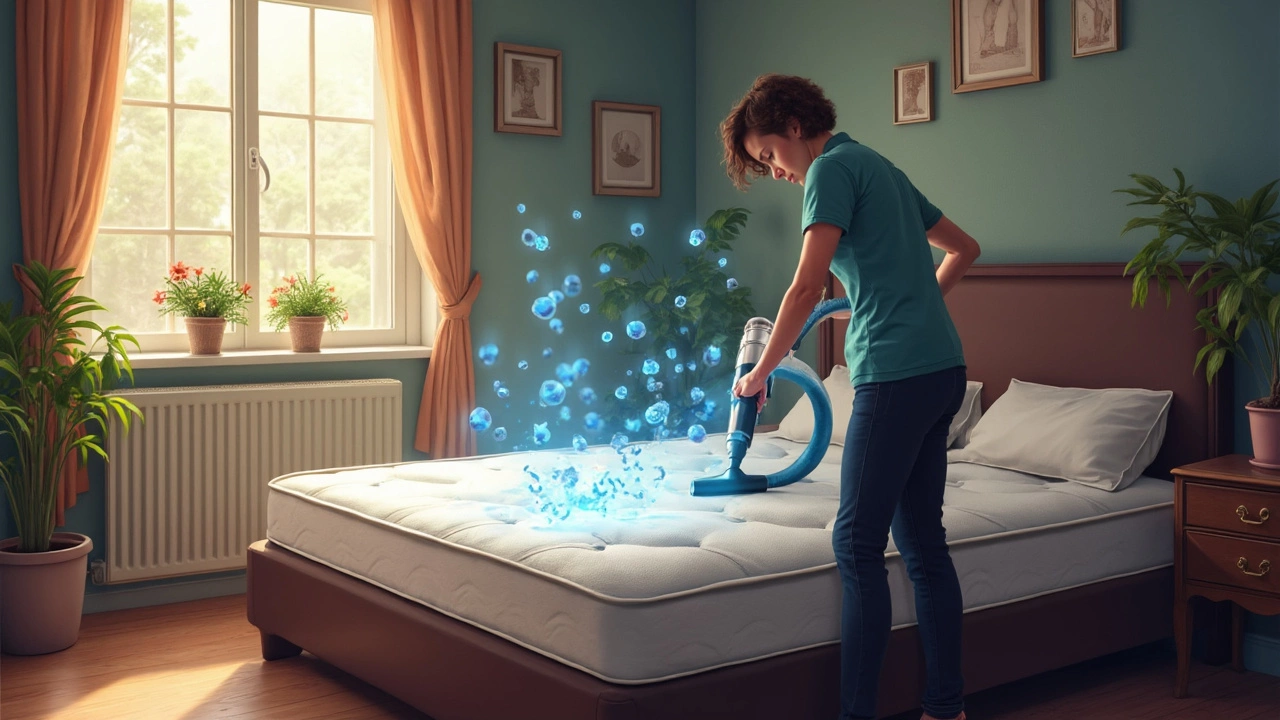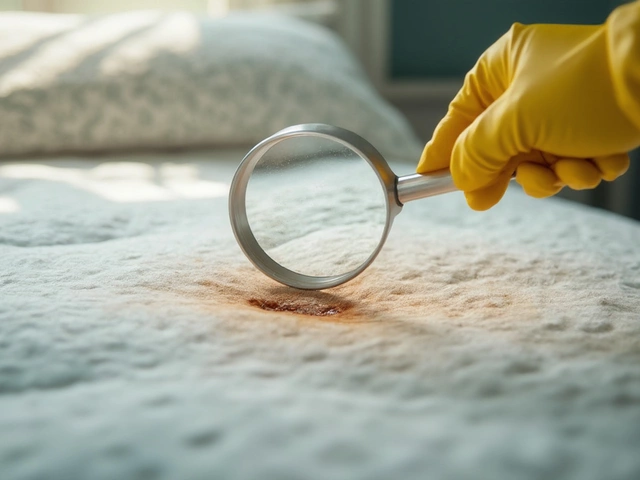Ever wondered what sperm consistency says about health? While it might seem like an odd starting point, understanding whether sperm is thick or runny can provide insights into overall well-being. And yes, believe it or not, the cleanliness of your mattress might play a surprising role.
Let's break it down: healthy sperm typically has a certain consistency that can vary for various reasons. It's not just about looking at it but also understanding what's going on inside the body. Factors like diet, hydration, and overall health influence consistency.
So, how does the idea of a clean mattress fit here? Think of your bed as more than a place for shut-eye. It harbors dust mites, allergens, and more, potentially affecting your health, including reproductive aspects. Keeping it clean not only supports good sleep habits but also contributes to a better lifestyle all around.
- Understanding Sperm Consistency
- What Thick or Runny Sperm Means
- The Science Behind Sperm Health
- How a Clean Mattress Contributes to Health
- Practical Tips for Mattress Cleaning
- Lifestyle Tips for Better Health
Understanding Sperm Consistency
Alright, let's dive into what makes sperm thick or runny and why it matters. Sperm consistency can actually tell us a lot about one's reproductive health. Many folks are curious because it's an easily noticeable trait.
What's Normal?
A typical healthy ejaculate tends to be somewhere in the middle—not too thick, not too watery. After ejaculation, it initially forms a gel-like substance, which typically liquefies within 15 to 30 minutes. This process, known as liquefaction, is important for fertility as it allows sperm to begin its journey.
What Affects Consistency?
Several factors can impact sperm consistency. Diet plays a role; staying hydrated is key, while things like alcohol or caffeine in excess might affect consistency. Stress and general health conditions also have an influence.
Health and Reproductive Implications
It's worth noting that if someone notices drastic changes, like persistently very watery or very thick semen, it might be a good idea to check in with a healthcare professional. It could indicate underlying health issues.
A Quick Look at Some Stats
| Sperm Factor | Ideal Range |
|---|---|
| Volume | 1.5 to 5 mL per ejaculation |
| Liquefaction Time | 15 to 30 minutes |
| Color | Whitish to grey |
While consistency isn't the only thing to consider, it's a simple way to gauge part of your reproductive health. Keeping tabs and seeking advice when needed is always a good move.
What Thick or Runny Sperm Means
Okay, let's dive into what the consistency of sperm actually indicates in terms of health. You may have heard terms like thick or runny sperm, and it's natural to wonder what they signify.
First off, thick sperm could be a sign of excellent health. When sperm is more on the thick side, it often suggests that the sperm count and quality are in good shape. Why's that? A higher concentration of sperm cells is usually present in thicker sperm, which might mean a better chance of success when it comes to fertility.
Runny Sperm: What's Going On?
On the flip side, runny sperm can occasionally signal possible issues. It's not all doom and gloom, though; sometimes it's completely normal. The key is knowing the context. Runny sperm might happen if there's been more frequent ejaculation or lower sperm count.
It's worth noting that neither thick nor runny consistency is inherently bad. Think of them as signals your body gives about what's happening inside. Health, dehydration, and even certain medications can impact sperm consistency.
Factors Affecting Sperm Consistency
Several elements can influence whether sperm is thick or runny:
- Hydration: Staying hydrated is crucial for overall reproductive health, affecting sperm consistency.
- Diet: A balanced diet with vitamins C and E can improve sperm quality.
- Lifestyle: Smoking and excessive drinking may impact sperm health and consistency.
- Frequency: The frequency of ejaculation changes sperm volume and thickness.
Understanding what thick or runny sperm means is not just about curiosity. It's a part of recognizing the signals your body sends you and knowing when everything's fine or when it might be time for a health check-up.
The Science Behind Sperm Health
Alright, let's get a bit scientific about sperm consistency. First off, sperm health isn't just about whether it’s thick or runny. It's got a lot to do with what's happening in the microscopic world of sperm cells.
Key Factors Affecting Sperm
Sperm is basically a mix of sperm cells and seminal fluid. The seminal fluid is crucial as it helps move sperm where it needs to go. This fluid's consistency can change due to many factors, like hydration levels. So, if you're not drinking enough water, it might become thicker, which isn't ideal.
Another important aspect is diet. Eating a balanced diet rich in antioxidants, like those found in fruits and vegetables, can boost sperm health. These nutrients help protect sperm cells from damage.
Lifestyle Impact
Think lifestyle and habits. Smoking, for instance, can lead to a decline in sperm quality. It doesn't just affect thickness but can also make sperm less motile (meaning less of a go-getter, in simple terms). Additionally, stress is a sneaky culprit affecting hormones, which in turn, impacts sperm production and consistency.
Stats You Should Know
On average, men produce millions of sperm each day, but only one is needed for conception. However, about 15% of men worldwide are affected by fertility issues, with sperm quality being a major contributor.
| Factors | Impact on Sperm |
|---|---|
| Hydration | Thicker seminal fluid if dehydrated |
| Diet | Antioxidants improve sperm health |
| Smoking | Decreases sperm quality |
| Stress | Can disrupt hormone balance |
So, improving lifestyle choices isn't just about feeling good but can also play a vital role in enhancing sperm consistency and overall fertility health. Think clean living, much like what you'd do with keeping your mattress in top shape.

How a Clean Mattress Contributes to Health
We spend about a third of our lives sleeping, and since mattresses are at the center of that downtime, keeping them clean is essential. A tidy mattress is crucial not only for getting a good night's sleep but also for our overall health.
First things first, a clean mattress can help reduce allergen exposure. Mattresses can become a magnet for dust mites, dead skin cells, and other allergens. These unwelcome guests can lead to allergies and affect your respiratory system.
Impacts on Sleep Quality
Dust mites and allergens can trigger sneezing, coughing, and even asthma, which isn't ideal when you’re trying to get shut-eye. Cleaning your mattress regularly helps you dodge these bedtime distractions.
A study found that people sleeping on clean bedding reported significantly improved sleep quality compared to those who didn't. So, by keeping that mattress fresh, you might just be signing up for better snooze sessions.
Maintaining Overall Health
Believe it or not, your bed can host a wide range of bacteria and fungi. A dirty mattress is a breeding ground for these microbes, which can pose health risks in the long run.
Considering mattress cleaning as part of your regular routine can reduce the chances of skin irritations and other infections. And let's not forget, a healthy body is more likely to have healthy sperm. So, there's somehow a connection between a clean bed and improved reproductive health!
Actionable Tips for a Clean Mattress
- Vacuum regularly: Get rid of dust, dead skin, and allergens that could impact health.
- Use a mattress protector: It’s much easier to clean a removable cover than the whole mattress.
- Address stains promptly: The sooner you act, the easier it is to clean spills or stains.
- Air your mattress: Let your mattress breathe by removing sheets and allowing air circulation.
Remember, a clean environment influences more than what we might initially think, making regular mattress cleaning a simple, yet powerful commitment to your family's health.
Practical Tips for Mattress Cleaning
Let's face it, cleaning a mattress isn't usually on the top of anyone's to-do list, but it’s crucial for maintaining good health. With dust mites and allergens lurking around, it’s essential to keep your sleeping surface fresh and clean. Here are some straightforward tips that can help you do just that.
Regular Vacuuming
Start by giving your mattress a good vacuum with a clean upholstery attachment. This removes dust, dead skin cells, and allergens lurking in the fabric. Make it a habit to vacuum your mattress monthly to keep it fresh and mite-free.
Dealing with Stains
Spills happen, but don’t worry. Mix a bit of mild detergent with water and gently dab the stain with a soft cloth. Avoid soaking the mattress, as too much moisture can lead to mold growth. Let it air dry thoroughly before putting the sheets back on.
Odor Control
To keep bad smells at bay, sprinkle some baking soda over the entire surface. Let it sit for a few hours, or overnight if possible, then vacuum it up. This not only freshens up your mattress but also helps absorb extra moisture.
Protect with a Cover
Invest in a good quality mattress protector. Not only does it shield against spills and stains, but it also reduces the amount of dust and allergens that settle onto your mattress.
Flip and Rotate
Wear and tear happen over time, so every six months, rotate or flip your mattress to help extend its life. This helps prevent lumps and bumps from forming in the areas where you sleep the most.
Quick Checklist
- Vacuum regularly
- Treat stains immediately
- Control odors using baking soda
- Use a protective cover
- Flip and rotate every six months
Keeping your mattress clean might take a bit of effort, but the payoff is a healthier, more inviting bed. With fewer allergens and less dust, you’ll not only sleep better but also create a nicer environment that can positively impact your general health.
Lifestyle Tips for Better Health
Looking for ways to boost your health naturally? You're in luck! Here are some tried-and-true lifestyle tips that have shown potential benefits not just for your general well-being but also for maintaining healthy sperm.
1. Stay Hydrated
Water does more than quench your thirst. Staying hydrated helps maintain bodily functions, including the quality of sperm. Keep a water bottle handy and aim for at least eight glasses a day.
2. Eat a Balanced Diet
A diet rich in fruits, vegetables, lean proteins, and whole grains can keep you feeling energized and your reproductive system functioning at its best. Consider incorporating foods high in antioxidants like berries, nuts, and spinach for added benefit.
3. Regular Exercise
Moving your body regularly supports your heart, enhances endurance, and may also improve sperm consistency. Try to include at least 150 minutes of moderate exercise into your weekly routine. This could be a brisk walk with your dog or a dance session in your living room—whatever gets you moving!
4. Get Enough Sleep
Quality sleep is vital for hormone regulation and overall health. Make sure your mattress is clean, free of allergens, and comfortable, and aim for 7-9 hours of sleep nightly to support bodily functions effectively.
5. Limit Alcohol and Avoid Smoking
While an occasional drink might not cause harm, excessive alcohol consumption and smoking are known to negatively impact reproductive health. Limit your intake and consider quitting smoking for optimal health benefits.
6. Manage Stress
Chronic stress can take a toll on your health. Try mindfulness activities like yoga, meditation, or simply taking a few deep breaths to reduce stress levels. Sometimes a few minutes of petting your goldfish Bubbles can work wonders too!
| Activity | Recommended Amount |
|---|---|
| Hydration | 8 glasses of water/day |
| Exercise | 150 minutes/week |
| Sleep | 7-9 hours/night |
These tips can make a positive impact not only on reproductive health but also on how you feel day-to-day. Give some a try and notice the difference they make!





